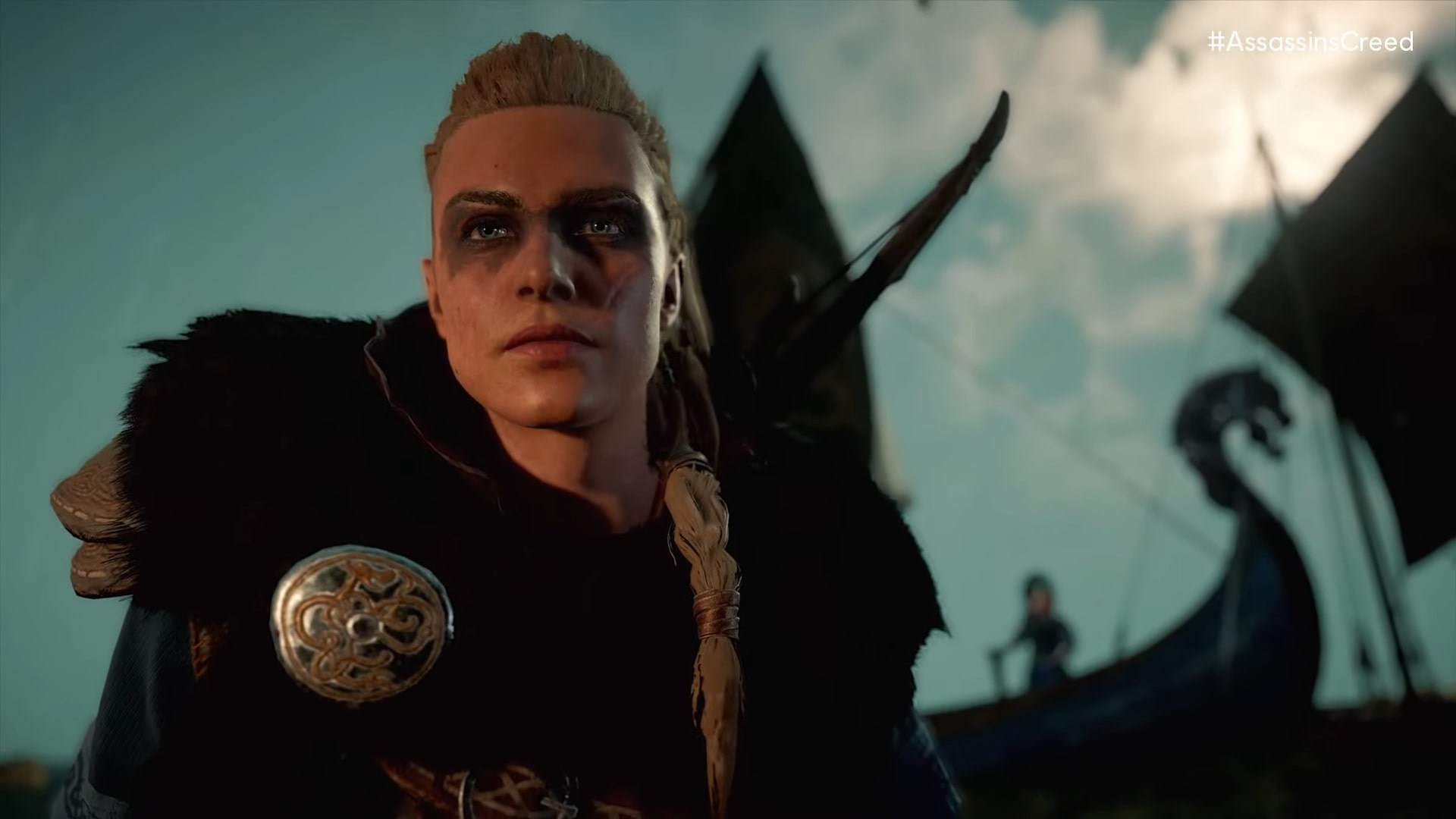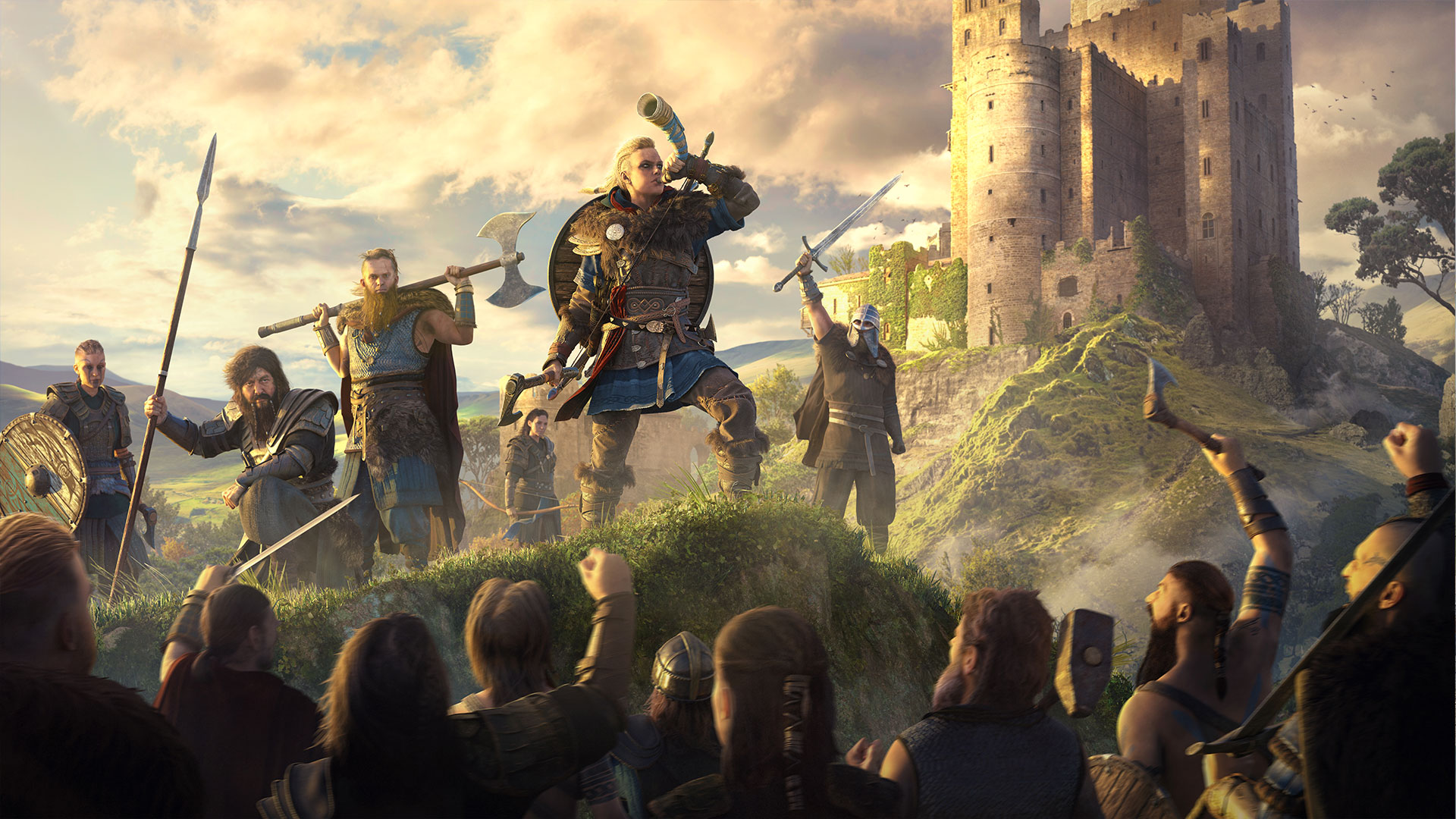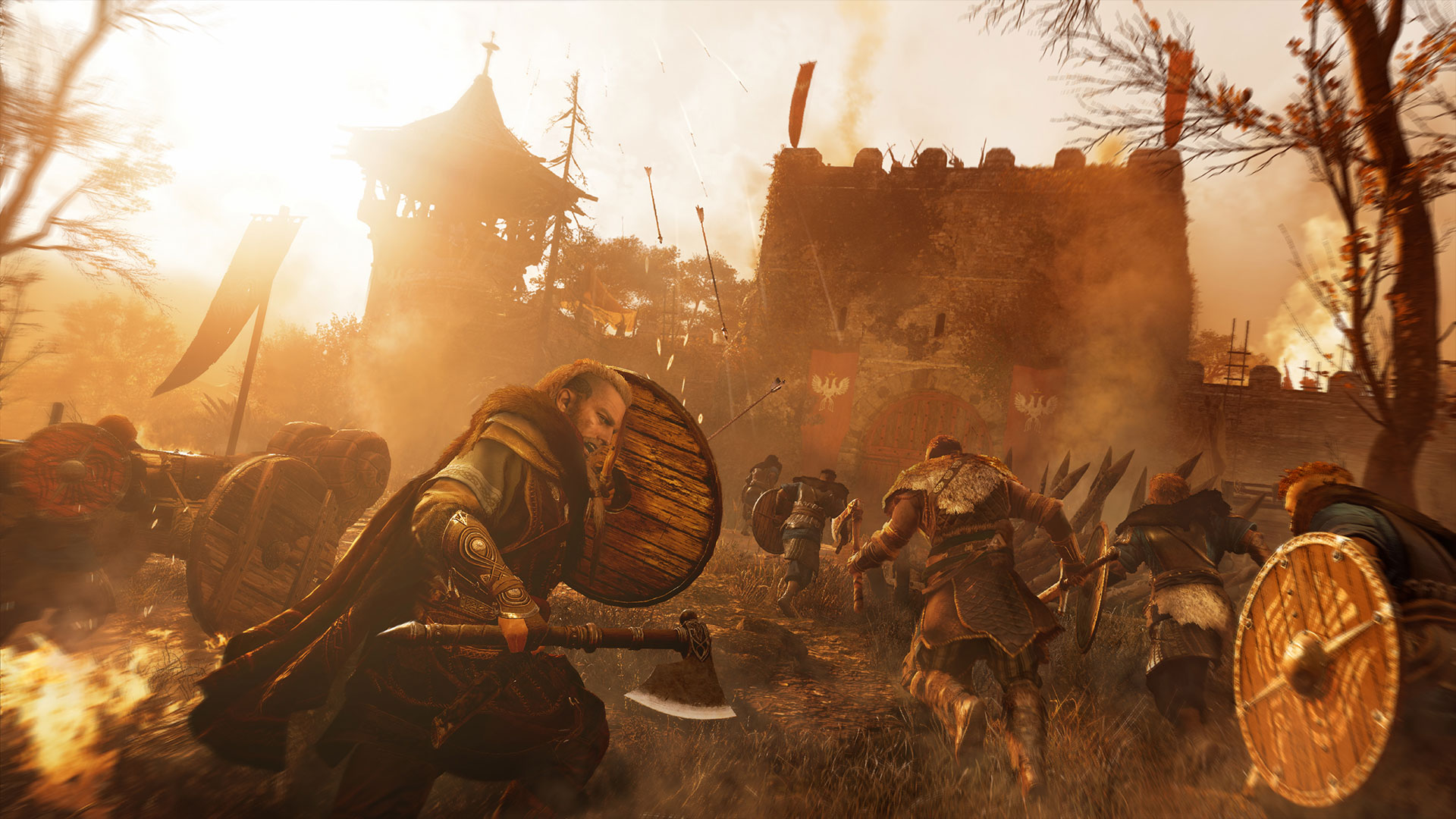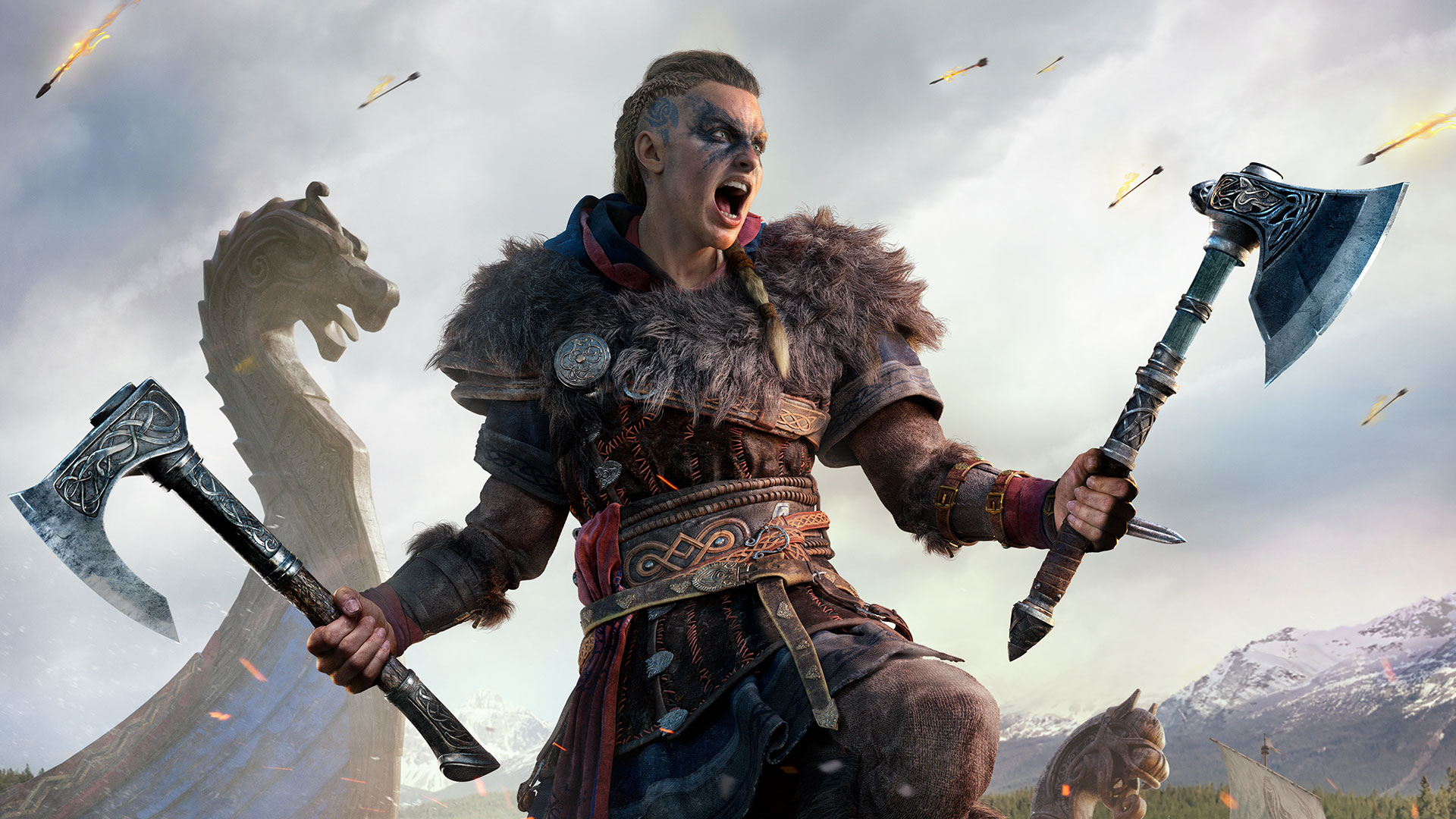Assassin's Creed Valhalla combat is built specifically to make you feel like a Viking, not an Assassin
Game director Eric Baptizat details the way of the Bear, Wolf, and Raven in Assassin's Creed Valhalla

As I watched Eivor decapitate a man with a fatal flick of an axe, it became clear that Assassin's Creed Valhalla is embracing the notoriously brutal way of the viking in its combat. Fighting in Valhalla is much slower, and more deliberate, than anything we've seen in recent wave of RPG-inspired Assassin's Creed games. Gone is the more nimble, almost dance-like combat of Assassin's Creed Odyssey, and although there are more parallels to be drawn between this and Assassin's Creed Origins, this is Assassin's Creed combat like you've never seen it before.
It helps, of course, that this is new territory for the series. Assassin's Creed Valhalla takes us back to the Dark Ages, circa 873CE, a period in which Norwegian Vikings began to settle on the shores of England. From what I've seen so far, the game does well to balance the English and Viking elements, with a huge part of the story – and the resulting violence – tied to the clashing of the two cultures. Huge raids are a big part of the game too, both in terms of story and as one of many options for attacking an enemy camp, which is where I got my first taste of exactly how bloody Valhalla's combat was going to be.
"What we wanted from the beginning is really this idea that the character is a Viking, first, you know?" says Eric Baptizat, game director of Assassin's Creed Valhalla. "It’s something very important, to be sure that we are true to what the Norse were in this time period," continues Baptizat, adding, "we want the player, without telling them directly, to live the drama that a Norse experienced in this time period."
Viking first, Assassin later

A big part of experiencing what it might be like to be a Norse in this period of history means you're going to need to wrap your head around some heavy, cumbersome weaponry. In my playthrough, I opted for wielding a large shield and an axe, which meant that parrying enemy attacks became an incredibly important component to the cycle of combat. A well-timed parry could send an enemy staggering back, giving me the space to get in a few attacks with my axe, or even send my foe crashing to the ground, offering up the opportunity for a head-crunching stomp attack.
But everything you do while fighting has to be precise, because the weapons are heavy, making them slow to physically wield in-game. A missed swing will be a real blow – pun intended – to your attacking strategy, and it means that actually taking an enemy down can be immensely satisfying. One thing you constantly need to be aware of, though, is that getting surrounded is pretty much a death sentence – enemy attacks are slow but deadly. Valhalla layers in strategy as much as it does physicality in its combat systems, forcing you to balance your basic attacks with perfect parries and dodges, and that's before we even get to the special abilities that you unlock as you progress.
"One objective was also to increase the strategy of the player, but also to increase the number of challenges," explains Baptizat. "Your new skills are really needed for enemies that you can't easily bypass. So there might be a block or skill you need that you must earn to be able to defeat them. A lot has been done to create a large variety of archetypes that are pretty different compared to what we used to have, but are more rich in terms of fresh strategies for the player."
How key these skills and ability will be for survival is laid bare in Assassin's Creed Valhalla's raids, staggering events that force you to balance a variety of threats at you at all times. These can range from lightly armed, no-named enemies, to bow-wielding marksmen and fast and deadly Berserkers. And if they don't provide enough of a challenge, then there's also the kind of enemy that might make your knees tremble – the Slayers. If ever there were a need to utilise the full extent of your abilities and arsenal, it'll be to take on Slayers.
Sign up to the GamesRadar+ Newsletter
Weekly digests, tales from the communities you love, and more
Bear, Wolf, or Raven?

Assassin's Creed Valhalla will give you the scope to decide what kind of viking you want to be. The game comes equipped with three distinct skill trees – Bear, Wolf, and Raven – that you can channel upgrade points into throughout the game, giving you the ability to really dial into your preferred style and approach to combat. "We wanted to have some symbolic animal to represent the three directions of the skill tree. If we do a caricature, we could say that the Bear is more of a warrior-oriented element. The Raven is more stealth-oriented, whilst the Wolf is more hunting-oriented," explains Baptizat.
"But it’s not only those three branches. Because in each branch, there is already a mix and variety of variable elements. So you can have new skills that are useful in combat, stealth, exploration and navigation, depending on the branch. It's not restricted," he tells me, noting that the system gets even deeper once you begin matching your weapons to each branch of the system. "The more you go into a branch, the more than you will see that you specialise in one type of weapon, and one type of track. You can really define which tactic you think is the best. Then the skills that you're going to learn will be very, very different [depending on which branch you focus on]."

The beauty of this is that then, you'll find that you have gear aligned to each animal focus, so investing in a certain specialism will be rewarded by aligning you with specific weaponry. And if you realised you've messed up and want to start again, you can reset your constellation of abilities whenever you want.
But thankfully, whatever you choose, the game will never penalise you for the choices you make, which track you align yourself with, or how you choose to approach a situation in combat. "Your strategy as a player doesn't impact the narrative of the story, apart from at that specific time. At that specific time, you really have a choice of strategy that can have impact, but most of the time it does not – it's really the dialogue choices where you can really have an impact [on the story]."
"Sometimes it’s as simple as fighting someone, or not fighting them. But it could be even bigger, like you decide who is going to become the leader of a territory, and you’re ready to carefully choose who you will put in place, because it will have consequences," says Baptizat. "It’s always tricky to draw a consequence based on what they did [in combat], because sometimes they don’t realise that they’ve actually killed 20 people."
Despite the fact that there's a huge focus on the brutality of combat in Assassin's Creed Valhalla – not to mention the physical, and emotional weight of it – the game is still encouraging you to play how you want to play. Skills, abilities, weaponry, aggression vs stealth… it's all there. It's just a case of deciding what kind of Viking you want to be.

Sam Loveridge is the Brand Director and former Global Editor-in-Chief of GamesRadar. She joined the team in August 2017. Sam came to GamesRadar after working at TrustedReviews, Digital Spy, and Fandom, following the completion of an MA in Journalism. In her time, she's also had appearances on The Guardian, BBC, and more. Her experience has seen her cover console and PC games, along with gaming hardware, for a decade, and for GamesRadar, she's in charge of the site's overall direction, managing the team, and making sure it's the best it can be. Her gaming passions lie with weird simulation games, big open-world RPGs, and beautifully crafted indies. She plays across all platforms, and specializes in titles like Pokemon, Assassin's Creed, The Sims, and more. Basically, she loves all games that aren't sports or fighting titles! In her spare time, Sam likes to live like Stardew Valley by cooking and baking, growing vegetables, and enjoying life in the countryside.


